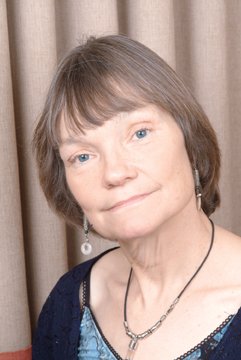Excerpts from the interview:
“When I first discovered science fiction, I thought, 'Why don't people know this genre?' Science fiction is the genre where you can step outside of today and look at things objectively, through casting them into the future. It has more potential than any other literary form out there. I can write perfectly good mysteries, but it was kind of a day job. I wrote mysteries because I couldn't support my kids by writing SF. I felt like a total failure in the SF field, though I can look back on it now and say, 'Child, you should have been much more grown-up about it!' My mystery stories were well received, but mysteries don't change the world -- it's entertainment fiction. For all that entertainment is a part of science fiction, I can say something there. People don't necessarily have to hear me, but I can say it.”
*
 “I just went through and revised Drylands. It was interesting doing that, for two reasons. I really do the science -- all my science is solid -- and everything the science predicted when I was researching in 1990 is coming true now. On the other hand, I realized that if I was writing it today, it would be much stronger. That really showed me how my writing has changed over the last several novels, some in mystery and some I haven't gotten published. I think I have more awareness of the strengths in my writing, but in terms of what I want to do with my writing I don't think it's changed that much.
“I just went through and revised Drylands. It was interesting doing that, for two reasons. I really do the science -- all my science is solid -- and everything the science predicted when I was researching in 1990 is coming true now. On the other hand, I realized that if I was writing it today, it would be much stronger. That really showed me how my writing has changed over the last several novels, some in mystery and some I haven't gotten published. I think I have more awareness of the strengths in my writing, but in terms of what I want to do with my writing I don't think it's changed that much.
“The strength of science fiction is the ability to say if this goes on, here's what will to happen -- letting people visualize it. Drylands was focused on environmental pressure. That's very topical now, so that's why I'm bringing it out again in Water Rites and hoping it will get reviewed. While I like to play Cassandra, I don't like to play Cassandra when my kids and I are living in that world! That's very disturbing.”
*
 “In Horizons the bad guys aren't North American (the worst of them are Asian), because the Americans are too inconsequential to be bad guys. One of the things I love to do in my fiction is to say, 'Folks! Hello? Don't you see the way things are going?' A few years down the road, in my World Council meeting scene, the US can get up and scream and nobody will pay attention.
“In Horizons the bad guys aren't North American (the worst of them are Asian), because the Americans are too inconsequential to be bad guys. One of the things I love to do in my fiction is to say, 'Folks! Hello? Don't you see the way things are going?' A few years down the road, in my World Council meeting scene, the US can get up and scream and nobody will pay attention.
“The science part of it, the mutants, came from my feeling that we're very much the children of this planet, in terms of the impact tides, gravity, lunar periodicity, and so forth have on us, and as those things change, so will we. The question in many of my stories -- the dominant question in the next book -- is where's the boundary line? What is the definition of human? Is humanity a concept based on genetics, or is it something else? We really haven't decided that, and maybe we never will, but I think we're going to become forced to try and do so.”
*
“I don't have various future histories that I deal with, just different aspects of the same one. I am still walking the same path I started out on. From the beginning, I have always had kind of a coherent future history in my head, and everything I've written (even the short stories) has fit in that pattern. It really has been a continuous progression. I think I'm digging a little deeper every time, so it hasn't changed in terms of where I see it going; it's gotten richer, more complex.
“I'm still doing short fiction, and I've made some recent sales to Asimov's and F&SF. I get the itch when I haven't done a short story for a while. I go through my various science magazines, and I can usually come up with at least two really good ideas I want to play with.”



